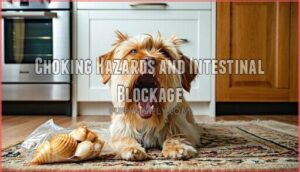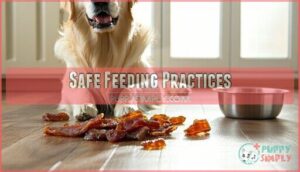This site is supported by our readers. We may earn a commission, at no cost to you, if you purchase through links.

Scallops are packed with protein, low in fat, and rich in nutrients like magnesium and potassium, which help with muscle and nerve function.
However, they need to be cut into small pieces to avoid choking, especially for smaller dogs. Introduce them gradually to prevent stomach upset, as new foods can sometimes cause trouble.
Skip raw scallops—those can carry bacteria harmful to your pup. Keep portions small, too much seafood isn’t ideal.
Curious about other seafood your dog can safely enjoy? Let’s explore further to find more seafood options that are safe for your dog, and remember to always introduce new foods gradually.
Table Of Contents
Key Takeaways
- You can give your dog scallops, but make sure they’re fully cooked, plain, and free of seasoning, oil, or shells to avoid choking hazards or digestive issues.
- Introduce scallops gradually to your dog’s diet to monitor for allergic reactions or sensitivities, and keep portions small to prevent upset.
- Scallops can be a nutritious addition to your dog’s diet, offering protein, omega-3 fatty acids, and essential minerals, but they shouldn’t exceed 10% of their daily calories.
- If your dog shows any unusual signs after eating scallops, such as itching, vomiting, or diarrhea, talk to your vet to determine the best course of action and ensure your dog’s health and safety.
Nutritional Benefits
Scallops are packed with essential nutrients like protein, omega-3 fatty acids, and vitamins that support your dog’s overall health.
They’re low in calories and fat, making them a healthy treat option when prepared properly.
High Protein Content
Scallops pack a punch in terms of protein, which plays a key role in muscle maintenance and energy production for your dog.
Packed with protein, scallops support muscle strength and energy, making them a nutritious treat for your pup!
With all essential amino acids and high protein digestibility, scallops are a great addition to dog nutrition.
As part of a balanced dog diet, their satiety benefits can help your pup feel full and satisfied.
Rich in Omega-3 Fatty Acids
If you’re considering seafood for dogs, omega-3 fatty acids in scallops offer impressive dog health benefits.
They support brain health, reduce inflammation, and improve joint support.
Plus, they help with coat improvement, giving your pup a shiny, healthy look.
Scallops for dogs also boost heart health, making them a smart addition to dog nutrition when prepared carefully.
Low in Calories and Fat
Packed with lean protein, scallops for dogs make great healthy treats.
They’re low-calorie and low-fat, perfect for weight management.
If you’re worried about obesity prevention, here are benefits:
- Supports portion control with small sizes.
- Fits well in balanced diets.
- Boosts energy without extra fat.
- Keeps treats light and simple.
- Encourages healthy eating habits.
For dogs needing to slim down, consider low fat dog food to manage their weight and support healthy eating habits.
Essential Vitamins and Minerals
While scallops are low in calories, they pack a powerful punch of vitamins and minerals your dog needs.
They’re rich in vitamin B12, magnesium, and phosphorus.
These nutrients aid vitamin absorption, boost immune support, and strengthen bone health.
Potassium helps maintain electrolyte balance, while magnesium improves mineral bioavailability.
It’s a nutritious boost to complement your dog’s protein-focused diet, providing a significant source of mineral bioavailability.
Can Dogs Eat Scallops
Yes, dogs can eat scallops, but only if prepared properly.
Dogs can enjoy scallops as a nutritious treat, but only when cooked properly to ensure safety and health benefits.
Scallops provide great health benefits like protein and omega-3s, which boost dog health.
Always serve them cooked – raw scallops can carry harmful bacteria.
It’s essential to offer safe amounts based on your dog’s size; small dogs should have less.
Scallops work best as occasional dog treats, not a daily food.
Watch for seafood allergies or reactions like upset stomachs.
For peace of mind, consider a vet consultation before adding scallops.
Preparation Guidelines
When preparing scallops for your dog, cook them thoroughly without adding any seasonings, oils, or butter.
Always remove the shells and make certain the scallops are cut into small, bite-sized pieces to prevent choking.
Cooking Methods
When preparing scallops for your dog, stick to simple methods like steaming, boiling, grilling, or baking.
Always cook scallops fully until opaque and firm to avoid bacteria found in raw scallops.
Avoid fried scallops, as oil and fats can upset your dog’s stomach.
Proper dog scallop preparation methods guarantee safety, with cooking times typically around 6-7 minutes.
For dogs with sensitive stomachs, consider other lean protein sources, like boiled chicken for dogs.
Removing Shells and Seasonings
When prepping scallops for dogs, always remove the shells. Those hard fragments can be a big choking hazard or cause serious issues like blockages.
Skip seasonings entirely—dogs don’t need them, and some can be harmful. Focus on safe preparation by cooking scallops plain with safe methods like steaming or boiling.
Consider scallops made for dogs as an alternative. Always double-check for sharp objects like shell pieces to ensure a safe preparation process.
Introducing Scallops Gradually
Start by giving your dog a small initial portion of fully cooked scallop to monitor for dog scallop reaction test signs like allergies or digestive issues.
Gradual increase over time allows safe dog new food introduction and frequency adjustment.
Always watch for dog allergies, and consult your vet for guidance.
Integrate scallops responsibly with their regular dog food.
Serving Size and Frequency
Regarding dog scallop serving size, portion control is key. For small breeds, one scallop is enough, while larger dogs might handle two or three.
Treat limits matter—scallops shouldn’t exceed 10% of daily caloric intake. Stick to an occasional treat, like weekly.
Dog scallop treat frequency depends on your pup’s feeding schedule and vet consultation recommendations, emphasizing the importance of daily caloric intake.
Potential Risks and Side Effects
Feeding scallops to your dog can come with risks if they’re not prepared or served correctly. Potential issues include allergies, choking hazards, and exposure to harmful bacteria or contaminants.
Shellfish Allergies and Poisoning
Allergies to shellfish can leave dogs itchy, bloated, or vomiting. Poisoning prevention is key—always cook scallops well and avoid cross-contamination with raw seafood.
Identifying allergens early matters; watch for:
- Symptoms like drooling, swollen paws, or diarrhea.
- Severe reactions like breathing trouble.
- Signs of dog shellfish poisoning or toxic foods.
Seek veterinary intervention if symptoms arise. Dogs can also enjoy other seafood, but raw options pose risks.
Choking Hazards and Intestinal Blockage
Poor scallop preparation methods can create choking hazards for dogs.
Shell fragment size is a major risk, as fragments might splinter and cause harm.
Some breeds, due to their size, are more prone to choking.
Prevention strategies like removing the dog scallop shell and verifying sizes protect against digestive harm.
Emergency vet care is needed if choking occurs.
It is crucial to take immediate action to prevent further complications.
| Risk | Cause | Prevention | Action |
|---|---|---|---|
| Choking | Shell fragments | Remove shells before feeding | Seek emergency vet care |
| Digestive harm | Sharp shell pieces | Check scallops for fragments | Consult a vet if ingested |
| Scallop size issues | Too large for dog breeds | Cut scallops appropriately | Monitor while feeding |
| Intestinal blockage | Unremoved scallop shells | Fully prepare scallops safely | Follow recommended guidelines |
Follow recommended guidelines to ensure the dog’s safety when feeding scallops.
Monitoring the dog while feeding and being prepared for emergency vet care can save lives.
Always prioritize the dog’s health and take preventive measures to avoid intestinal blockage and other risks associated with scallop consumption.
Gastrointestinal Upset and Sensitivity
Dogs with sensitive stomachs may face gastrointestinal issues when eating scallops.
Gradual introduction is key to avoiding dog upset stomach or digestive issues.
Cooking scallops thoroughly helps the dog digestive system process them better.
Adding probiotics benefits digestion and supports hydration importance.
Always monitor for dog stomach issues, like bloating or gas, when introducing new foods to maintain digestive enzymes’ balance.
Mercury Toxicity and Contaminants
Watch out for mercury levels in scallops. Seafood can contain heavy metals that harm dogs over time. Mercury toxicity may lead to kidney damage if scallops or similar foods are eaten often.
To guarantee safe consumption, follow these steps:
- Avoid overfeeding seafood.
- Choose fresh, properly cooked scallops.
- Limit scallops in their diet.
- Check for contamination sources.
- Monitor for toxicity symptoms.
Safe Feeding Practices
When feeding scallops to your dog, stick to fresh or frozen ones without additives or seasonings.
Always introduce them in small amounts and balance them with their regular diet to guarantee safe and healthy enjoyment.
Choosing Fresh or Frozen Scallops
Picking scallops? Fresh ones smell slightly sweet, not fishy.
Frozen scallops last longer but check for freezer burn to guarantee dog food safety. Some pet owners even look for frozen scallop options designed specifically for dogs.
Use this quick comparison:
| Aspect | Fresh Scallops | Frozen Scallops |
|---|---|---|
| Freshness Indicators | Smell, firm texture | No ice crystals |
| Frozen Shelf-Life | Short | Months |
| Storage Differences | Requires refrigeration | Freezer storage |
| Cost Comparison | Higher | Lower |
Choose fresh or frozen based on convenience!
Avoiding Additives and Preservatives
When choosing scallops for your pup, skip additives and preservatives for dog food safety.
Keep it simple and healthy by focusing on additive-free options.
- Read labels closely for hidden ingredients.
- Opt for natural alternatives over processed varieties.
- Use home preparation for control over ingredients.
- Verify safe sourcing from trusted suppliers.
- Explore dog treat recipes for cleaner, wholesome snacks.
Monitoring for Adverse Reactions
Keep an eye on your dog after feeding scallops.
Watch for allergy symptoms like skin reactions, itching, or swelling.
Notice any digestive changes, such as vomiting or diarrhea, or unexpected behavioral shifts.
Dog adverse reactions could signal severe allergies, so consult your veterinarian for guidance.
Promptly addressing dog scallop allergy symptoms helps prevent potentially fatal reactions and guarantees your pet’s safety.
Balancing Scallops With Dog Food
When feeding scallops to your dog, think of them as a bonus, not the main event.
Incorporate scallops into a balanced diet, ensuring treats don’t exceed 10% of daily calories.
Consider scallops as dog treats for supplemental feeding.
For proper dietary integration, balance scallops with nutritionally complete dog food, and follow vet advice to craft meals that meet your dog’s needs while keeping their nutrition on point.
Health Considerations
When feeding scallops to your dog, it’s important to bear in mind allergies and sensitivities they might have.
These can lead to digestive issues, so always monitor their reaction and consult your vet if needed, considering allergies and sensitivities is crucial for their health.
Scallop Allergies and Sensitivities
Scallop allergies in dogs can trigger symptoms like itching, swelling, or vomiting.
Some breeds may have a predisposition to shellfish allergy or cross-reactivity with other seafood.
Diagnostic testing helps pinpoint specific allergens.
Allergic reactions range from mild to severe.
Always monitor for dog allergic reactions, especially after introducing new foods, as severe allergies can lead to potentially fatal reactions.
A hair sample collection can help determine specific sensitivities.
Stomach Discomfort and Digestive Issues
If your dog has a sensitive stomach, scallops might trigger issues.
Overfeeding can lead to dog diarrhea, vomiting, or general digestive discomfort.
Watch for these signs:
- Scallop Intolerance: Dogs may struggle with new foods.
- Sodium Content: High levels harm digestion, increasing pancreatitis risk.
- Dog Digestive Issues: Introduce gradually to avoid upset stomachs.
Pet Insurance and Veterinary Care
Veterinary costs can rise fast if your dog has severe allergies or a fatal reaction to scallops.
Pet insurance helps cover emergency treatment or a routine dog vet visit. Compare policies for preventative care and coverage.
Here’s a helpful breakdown:
| Topic | Covered by Insurance? | Estimated Cost |
|---|---|---|
| Dog allergic reactions | Yes | $100–$300 per visit |
| Emergency treatment | Often | $500–$2,000 |
| Regular check-ups | Yes | $50–$150 per visit |
This breakdown can help you understand what is covered by pet insurance and what to expect in terms of estimated costs.
Alternatives to Scallops for Dogs With Allergies
When dealing with dog allergies, novel proteins like lamb or duck and fish alternatives such as cooked salmon or sardines can ease dog skin irritation.
Limited diets with plant proteins like soy or beans may help too.
Always use gradual introduction to monitor for allergic reactions like dog vomiting or diarrhea.
Allergy testing guarantees safety while managing your dog’s health, ensuring a safe and effective approach to handling dog skin irritation.
Frequently Asked Questions (FAQs)
Can dogs eat scallops?
“When in doubt, go without” comes to mind here.
Dogs can eat scallops if they’re fully cooked, plain, and free of seasoning, oil, or shells.
Serve as an occasional treat in small portions.
Is cantaloupe safe for dogs to consume?
Yes, cantaloupe is safe for dogs in moderation.
It’s hydrating and packed with vitamins, but you should remove seeds and rind first.
Offer small pieces as a treat to avoid any digestive issues.
Can puppies have scallops?
Of course, puppies can enjoy scallops, but only in moderation and fully cooked.
Start small, skip the seasoning, and always remove shells.
Treat scallops like an occasional snack, not a meal replacement, for safer feeding.
Can dogs be allergic to scallops?
Dogs can be allergic to scallops, just like other seafood.
Allergies might cause itching, vomiting, or diarrhea.
If your dog shows any unusual signs after eating scallops, talk to your vet to stay safe.
How do I know if my dog eats scallops?
If your dog eats scallops, you’ll notice chewing or licking around seafood.
Look for signs like an empty plate, scallop odor, or loose shells nearby.
Monitor closely for reactions like upset stomach or unusual behavior, including upset stomach.
Are scallops healthy?
You’ll find scallops are a nutritious, protein-rich food, offering various health benefits, including omega-3 fatty acids and essential minerals, making them a healthy addition to your dog’s diet occasionally.
What seafood should dogs not eat?
Like a treasure chest of toxins, beware of seafood like raw salmon, sardines, and shrimp, which can harbor harmful parasites and bacteria, you should avoid feeding them to your pet.
Can dogs eat scallop feet?
You can feed your dog scallop feet, but make certain they’re fully cooked, plain, and free of shells to avoid choking hazards or digestive issues.
Can dogs have scrambled eggs?
You can give your dog scrambled eggs, a nutritious, easily digestible treat, but introduce them gradually to monitor for allergies or digestive issues, and cook them plain.
Who shouldn’t eat scallops?
You shouldn’t eat scallops if you have shellfish allergies, as they can cause vomiting, diarrhea, or skin irritation, and potentially lead to more severe reactions.
Conclusion
Now you know the answer to can dogs eat scallops.
You’re serving your dog a nutritious meal, remember to cook scallops plain. Introduce them gradually, and keep portions small to avoid upset.
By following these guidelines, you’ll guarantee your dog enjoys scallops safely, so go ahead and add them to their diet, but always prioritize their health when considering can dogs eat scallops.

















